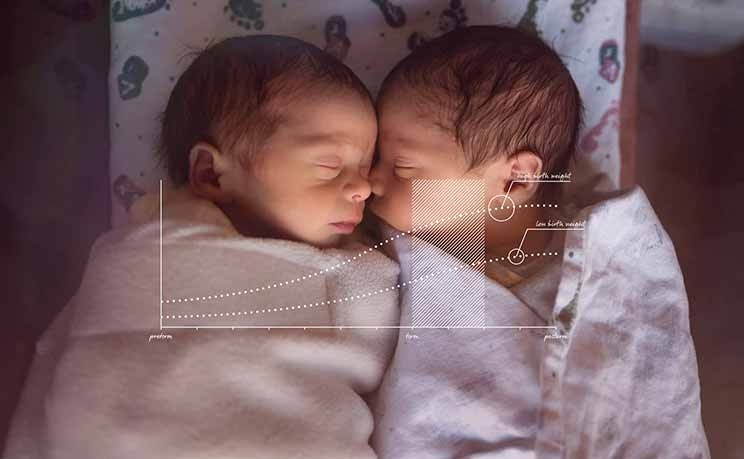AncestryDNA® Traits
Birth Weight
The average baby weight in the U.S. is 7.5 pounds, with up to 15% body fat. All that pudge makes newborn babies more cuddly, but it also helps feed their growing brains, which can use half or more of their energy every day.
Was your baby weight average? An AncestryDNA® + Traits test can tell you a little something about the connection between your DNA and your birth weight.

More About Average Baby Weight
There’s a large range of healthy average baby weights at birth. The average baby is born weighing from 5 pounds, 8 ounces to 8 pounds, 13 ounces.
Many premature babies weigh less than 5 pounds, 8 ounces, which may be called "low birth weight." But just because a baby has a lower (or higher) than average birth weight, it doesn't always mean there's something wrong. Sometimes babies simply weigh less (or more) than average.
About 1 in 12 babies in the U.S. has a low birth weight. Most end up eventually gaining weight and catching up to their peers. But after birth it's normal for a weight loss of about 7% to 10%, which is mostly just extra fluid.
Genetics of Baby Birth Weight
If you had a low baby weight at birth, will your child be born lighter than average also? Some studies suggest genetics may account for 30% to 80% of baby birth weight variation.
Although science is still learning more about the genes that affect birth weight and how they interact, it's known that certain DNA differences are often linked to lower birth weights.
Low birth weight is an "additive" trait. The more "low weight" DNA differences you have, the more likely it is that your birth weight was below average. So if your biological parents had low birth weights, you're more likely to have been born on the lighter side. But it's not a guarantee.
What Science Says About Birth Weight
Many other things besides genetics can have an impact on a baby’s birth weight. One of the biggest of these factors is the length of the mom's pregnancy. Babies born closer to their due dates tend to weigh more.
A pregnant woman's diet, her weight, and overall health also affect the baby's weight at birth. For example, if the mom has health problems like high blood pressure or heart issues, this can contribute to her baby's low birth weight. Mothers with diabetes, on the other hand, tend to give birth to heavier-than-average babies.
Biological sex can also play a role in birth weight: Overall, boys tend to weigh more than girls at birth.
Interesting Facts About Baby Weight at Birth
Human babies have among the highest fat percentage of any baby mammal. But scientists aren’t sure if the higher percentage of fat is more for warmth or to nourish their big brains. And while most babies born weigh from about 6 to 8 pounds, there are notable exceptions. The biggest baby on record was 22 pounds, born in Ohio in 1879. His mother was 7 feet, 11 inches tall.
The smallest surviving preterm birth is considered to be Baby Saybie, born at 23 weeks in 2018. She weighed 8.6 ounces, which is about the size of a large apple. Saybie spent five months in a hospital before she could go home. During that time, her growth and development included a healthy weight gain: she weighed 5.6 pounds when she went home to her parents.
What does your DNA say about your birth weight? Find out with an AncestryDNA® + Traits test.
References
Cunnane, Stephen C. "Survival of the Fattest: the Key to Human Brain Evolution." Med Sci (Paris). June-July 2006. https://pubmed.ncbi.nlm.nih.gov/16828044/.
Hoke, Morgan K. "Baby Fat Is About More Than Cuteness." SAPIENS. January 23, 2018. https://www.sapiens.org/body/baby-fat-is-about-more-than-cuteness.
Horikoshi, Momoko, Hanieh Yaghootkar, et al. "New loci associated with birth weight identify genetic links between intrauterine growth and adult height and metabolism." Nature Genetics. January 2013. https://pubmed.ncbi.nlm.nih.gov/23202124/.
Kuzawa, Christopher W. "Adipose tissue in human infancy and childhood: An evolutionary perspective." American Journal of Physical Anthropology. January 1999. doi:10.1002/(sici)1096-8644(1998)107:27 <177::aid-ajpa7>3.0.co;2-b.
"Low Birthweight." Stanford Children's Health. Accessed August 4, 2023. http://www.stanfordchildrens.org/en/topic/default?id=low-birthweight-90-P02382.
Magnus, Per, Håkon K. Gjessing, et al. "Paternal contribution to birth weight." Journal of Epidemiology & Community Health. December 2001. https://pubmed.ncbi.nlm.nih.gov/11707480/.
Mook-Kanamori, Dennis O., Catharina E M Beijsterveldt, et al. "Heritability Estimates of Body Size in Fetal Life and Early Childhood." PLoS ONE. July 2012. https://journals.plos.org/plosone/article?id=10.1371/journal.pone.0039901.
"WHO Child Growth Standards: Length/Height-for-Age, Weight-for-Age, Weight-for-Length, Weight-for-Height and Body Mass Index-for-Age: Methods and Development." World Health Organization. November 11. 2006. https://www.who.int/publications/i/item/924154693X.